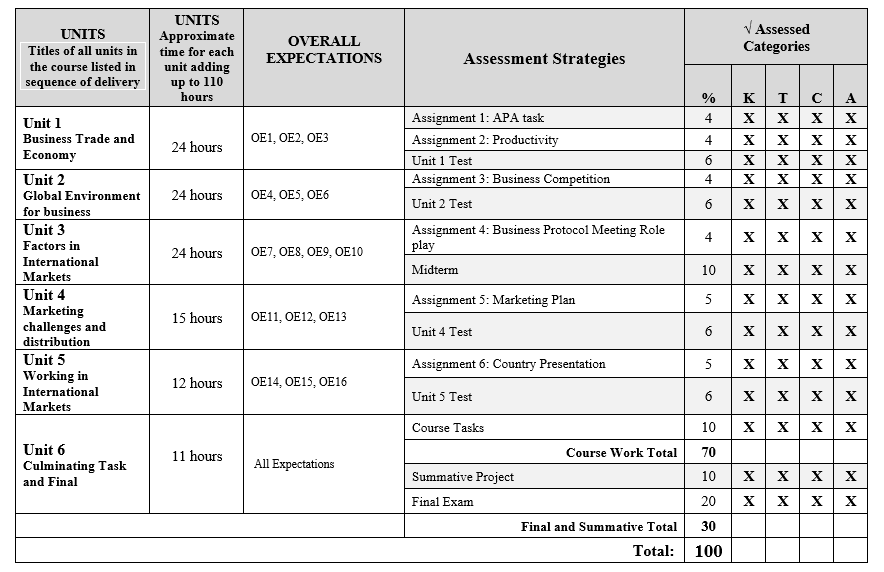Course Description
This course provides an overview of the importance of international business and trade in the global economy and explores the factors that influence success in international markets. Students will learn about the techniques and strategies associated with marketing, distribution, and managing international business effectively. This course prepares students for postsecondary programs in business, including international business, marketing, and management.
Course Code: BBB4M
Course Name: International Business
Department: Business
Hours: 110
Credit Value: 1.0
Pre-requisites: None
Curriculum Policy Documents: The Ontario Curriculum, Business Studies, Grades 11 & 12. English, 2006 (Revised)
Growing Success: Assessment, Evaluation, and Reporting in Ontario School. 2010.
Development Date: August 2019
Developed By: Jimmy Chia
Teacher’s Name: Jennifer Crozier
Overall Curriculum Expectations
Course Content
| Unit | Unit Title | Approx. Duration |
| Unit 1 | Business Trade and Economy | 24 hours |
| Unit 2 | Global Environment for Business | 24 hours |
| Unit 3 | Factors Influencing Success in International Markets | 24 hours |
| Unit 4 | Marketing Challenges and Approaches, and Distribution | 15 hours |
| Unit 5 | Working in International Markets | 12 hours |
| Unit 6 | Culminating Activities (ISU and Final Exam) | 11 hours |
| TOTAL | 110 hours | |
Unit Description
Teaching/Learning Strategies
- Research project
- Independent study
- Oral Presentations
- Debate
- Case summary
- Presentation
- Graphic Organizers
- Computer-Mediated Instruction
- Lectures
- Discussions
- Reading
- Pair Work
- Role Play
- Brainstorming
- Group work
Unit Organization

Assessment Strategies
| For Learning | As Learning | Of Learning |
|
|
|
Evaluation Strategies
Evaluation focuses on student’s achievement of the overall Expectations. Evaluation is basically collected from; observations, conversations, and student products.
Student Products include: tests, exams, rich performance tasks, projects, presentations and /or essays. Students submitting assignments that involved group work will be evaluated individually.
Before making a decision about a student’s final grade, the teacher will consider all the collected evidence of student products. The teacher will also consider that some evidence carries more weight than other evidence.
| Achievement Level | Percentage Mark Range |
| 4+ | 95-100 |
| 4 | 87-94 |
| 4- | 80-86 |
| 3+ | 77-79 |
| 3 | 73-76 |
| 3- | 70-72 |
| Achievement Level | Percentage Mark Range |
| 2+ | 67-69 |
| 2 | 63-66 |
| 2- | 60-62 |
| 1+ | 57-59 |
| 1 | 53-56 |
| 1- | 50-52 |
The final grade will be determines as follows:
- 70% Seventy percent of the grade will be based on evaluation conducted throughout the course.
- 30% Thirty per cent of the grade will be based on a final evaluation and the summative administered at or towards the end of the course.
Evaluation/Assessment Plan
| Unit | Unit Title | Approx. Duration | KICA % Application |
| Unit 1 | Business Trade and Economy | 24 hours | 25/25/25/25 |
| Unit 2 | Global Environment for Business | 24 hours | 25/25/25/25 |
| Unit 3 | Factors Influencing Success in International Markets | 24 hours | 25/25/25/25 |
| Unit 4 | Marketing Challenges and Approaches, and Distribution | 15 hours | 25/25/25/25 |
| Unit 5 | Working in International Markets | 12 hours | 25/25/25/25 |
| Unit 6 | Culminating Activities (ISU and Final Exam) | 11 hours | 25/25/25/25 |
| TOTAL | 110 hours | ||
Resources
Shultz, M. David Notman and Ruth Hernder. (2003). International Business, Canada and Global Trade Nelson Canada.
